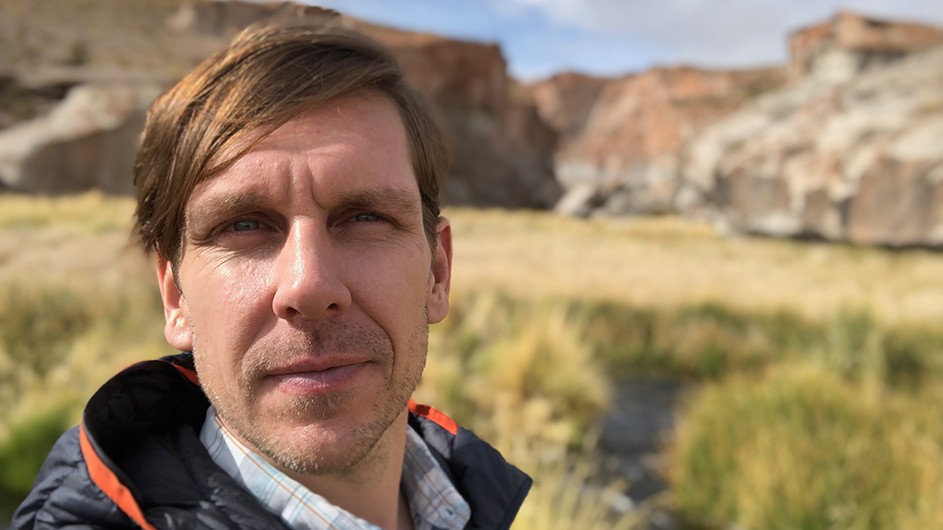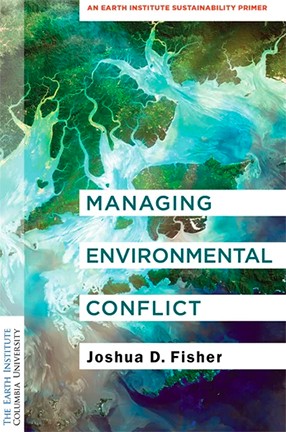As Environmental Conflicts Increase, How Can They Be Managed?
Research scientist Joshua Fisher provides solutions in his new book.

Conflicts frequently arise over environmental issues such as land use, natural resource management, and laws and regulation, emerging from diverging interests and values among stakeholders. Managing Environmental Conflict by Joshua Fisher, a research scientist at Columbia Climate School, is a primer on causes of and solutions to such conflicts. The book provides a foundational overview of the theory and practice of collaborative approaches to managing environmental disputes.
Fisher explains the core concepts in cooperative conflict management, and presents a practical framework for understanding and responding to environmental disputes.
He discusses the book with Columbia News, as well as what led him to his research, the work he’s doing with Hiroshima University, and why he would like to seat Carl Sagan across from Confucius at a dinner party.
Q. What inspired you to write this book?
A. Every day we are bombarded by stories of conflict, polarization, and the existential threats of climate change and biodiversity loss. However, there are countless examples of people coming together to constructively solve problems and collaboratively manage their environments—both built environments and natural systems.
As a research scientist working in biodiversity conservation and conflict management, I've learned from hundreds of organizations doing interesting, innovative, and effective work. I wrote this book to provide people with the tools for understanding the environmental conflicts they face and building collaborative strategies to manage them.

Q. Can you give an example from the book of an environmental conflict that was resolved collaboratively?
A. Across the Amazon Basin, issues around access to natural resources, land tenure, economic development, sovereignty, and dignified livelihoods are creating huge challenges for societies and ecosystems. Protected areas have been established to safeguard ecosystem services, but they also present obstacles to development of certain natural resources like timber, gold, and agriculture.
In the Peruvian Amazon, networks of stakeholders and protected area managers have come together to create cooperative approaches to conflict management, with the ultimate goal of improving protected area governance. By building conflict management directly into protected area management, these networks are able to build more resilient governance platforms.
Q. How does climate change intersect with managing these sorts of environmental disputes?
A. Environmental disputes are basically conflicting interests and needs among diverse groups of people related to natural resources and ecosystem services. Conflict arises when some aspect of the social or environmental system changes and brings peoples' incompatible interests into direct tension. In that context, climate variability and our policy responses to it are giving rise to new flashpoints. Across societies, people are having to renegotiate their relationships with each other in the context of climate change. It’s essential that we find ways to enable constructive conflict management.
Q. What led you to this research?
A. I was raised on a farm in the American West where climate change, water management, land tenure, and public policy present grave challenges for rural communities. From an early age, I wanted to work to support communities around the world who face similar dilemmas.
At the Climate School, my research is focused on finding ways to use natural resource management to solve social conflict. I merge physical science with social science methods to uncover and explain the risks and hazards that communities face. I use the results from environmental fact-finding to inform multistakeholder planning initiatives with the goal of creating socially beneficial resource management plans.
Q. What are you teaching this semester?
A. This semester, I've partnered with Hiroshima University to develop a network of researchers and practitioners focused on peace and sustainability. The network, www.nerps.org, is modeled on the Earth Institute. I'm leading applied research on natural resource governance, and am focused on bringing together multidisciplinary teams of land use planners, policy experts, ecologists, and social scientists.
Q. You're hosting a dinner party. Which three academics or scientists, dead or alive, would you invite, and why?
A. I would invite the political economist Elinor Ostrom, whose work inspired me to think of ways to bridge ecological models and social science. Inviting her would be a way to show my gratitude.
I'd also invite Carl Sagan. He had a unique ability to see the connections across all scales of life. I'd probably round the evening out with Confucius, whose focus on living ethical, moral, and balanced lives might offer some insight into navigating the complicated current dilemmas society faces.
Check out Books to learn more about publications by Columbia professors.